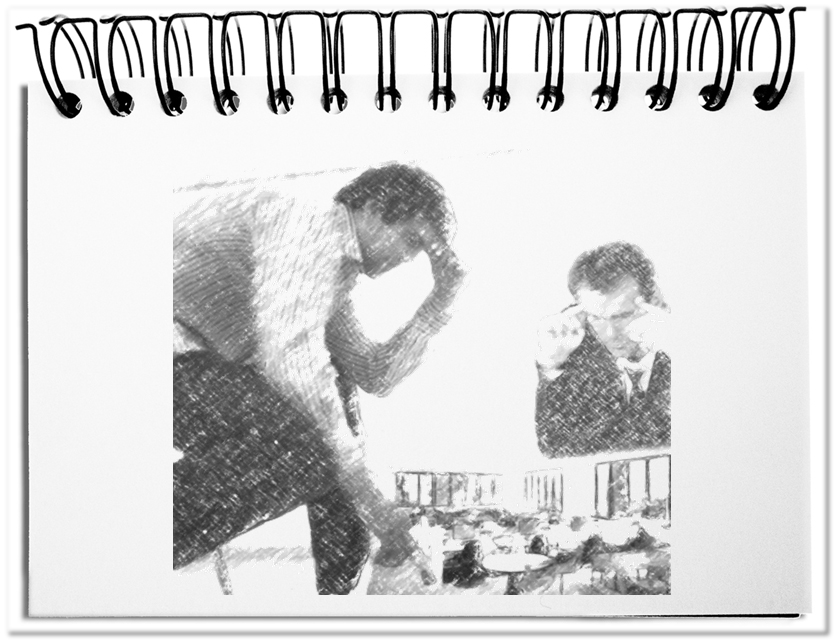Handworkers were the driving force for the development of the economy for a long time. They had the production of tools and things of everyday life in their hands – tanners, furrier, saddlers, shoemakers, bakers, painters, smiths etc. Complexer commodities could be produced by bundling different crafts in manufactories. This initiated the transition into industrial manufacturing. The breaking down of work into individual tasks, the so-called division of labor, has passed its peak in the 20th Century. Since the computer executes the “manual” activities faster and more reliable, the question about the future roles of the staff arises. The brainworkers will certainly become a large, new group.
The new types of employee will have no longer an affect through their hand, but through their brainwork. The feedstocks are less likely of physical, but predominantly of mental nature. In both cases the smart use of tools is decisive for the performance of the employees. Hammer, screw driver and brush are replaced by the computer and its various programs. The handworkers gain their abilities through regular exercise and longtime experience in handling the tools and materials. The new brainworkers develop their abilities through training and benefit from the acquired practice in handling ideas, drafts and other reasoned outcomes. Potential familiar brainworkers are: Chief Knowledge Officer, Knowledge broker, Change manager, Organization developer, Chief Information Manager. In the future new roles will emerge that will take care of information.
Brainworkers generally have the following tasks, authorities and responsibility as well as the respective capabilities.
- Tasks
are the activities of a role in dealing with information. Depending on the specific task, information is created, processed, stored, searched, updated, reused and deleted as well as distributed and additionally explained. Furthermore general tasks evolve – brainworkers guarantee the flow of information, prevent the loss of data, improve fundamental methods and actions, support the daily work with words and deeds and describe general relationships. They use social networks, IT-tools and all aspects of project-related work. - Authority
describes the rights of a role that it needs for the execution of its tasks. All participants must be put into the position to provide and use information according to their role. This starts with the informational self-determination concerning the own, personal representation and goes up to the production of data and reports in the business context. Search engines as well as the barrier-free access improve the quality of the outcomes. The creators must it be allowed in case of further inquiry to describe their produced contents. - Responsibility
describes the obligations in managing information. Since everybody is on the one hand user AND on the other hand supplier of contents, governance is required for handling information. This includes that all creators provide the data, which represents the bases of the information, with the correct quality (e.g. correctness, completeness, consistency and up-to-dateness). During the processing the quality should be maintained. The enterprises, institutions and governmental bodies, where people work, have to ensure that on the one hand the employees can process the information in a qualified way and on the other hand that data will not get lost, wrongly interpreted, or abused in any way. - Capabilities
are the knowledge and dexterities of the brainworkers. This includes technical, methodical, social and systemic abilities in dealing with data, information and knowledge. The parties concerned must be able to interpret similarly the data in the respective industry sector and business environment. They need the proficiency for the procedures of the individual tasks. Cooperation and guidance have a central role since all results are produced in teams. It is necessary to develop skills, in order to master the social networking, various IT-systems as well as methods and procedures of time and project management. Today, enterprises are less regarded as clockworks, but more as organisms. This demands holistic thinking, system understanding and change competency for all participants.
The challenges for each brainworker are the balancing act between sharing information and the sustainable competitive advantage through brainwork. Information increases its value through as much as possible frequent and extensive sharing. It becomes the common property that everyone can use for its own advantage. The knowledge advantage, symbolized through ‚knowledge is power’, is thereby replaced with the ability ‚to create knowledge’. This requires that brainworkers learn continuously, create and transfer new relationships into the business practice. In the future, the borders between hand and brainworkers will blur. But the one will not function without the other.
After thought: The transition from hand to brainworker will be revalued in medium-term. The old proverb will be valid again “A trade in hand finds gold in every land”.

